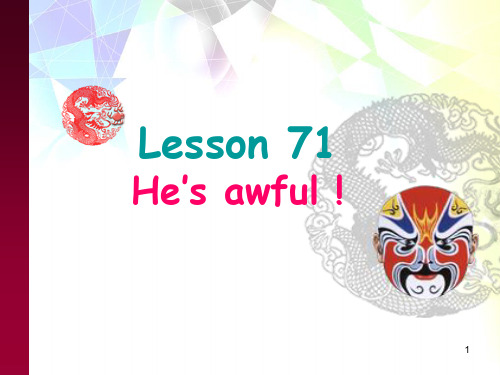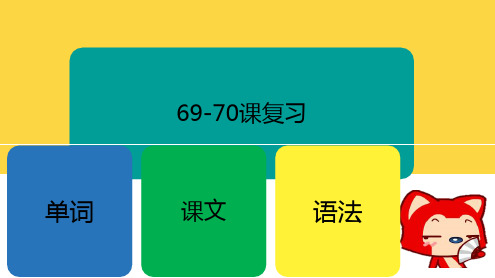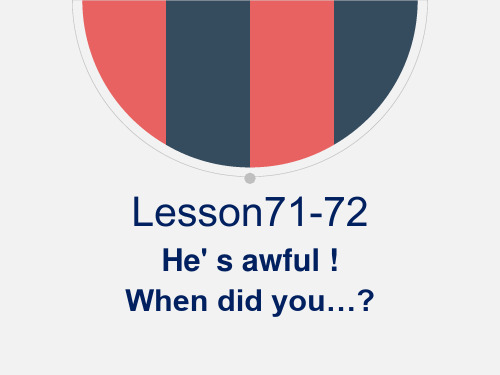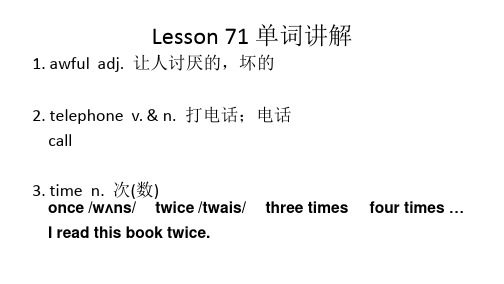新概念第一册71和72课课件
新概念英语第一册Lesson71-72(课堂PPT)

Italy
America
Japan 22
Austria
Australia
Canada
• There were twenty cars in the race. There were Austrian cars, Australian cares, Canadiancars. Dane cars. Finlish cars and Polish cars.
If the train should be on time, I should reach home before dark.
18
★ 介词 in:
一天中的某段时间(in the evening)
月份(in March) 年份(in 1997) 季节(in spring)
世纪(in the 20th century) 节日(in Easter week【时间长的】 ) 时期(in the holidays)
• India • Turkey • Korea • Nigeria [naiˈdʒiəriə]
• Japan
• Russia
• Australia
• Brazil [brəˈzil]
• • • • • •
ACDFPToiaheunlnsanalaatminlrndadaidanardk[ˈdenmɑ:k•••••]
17
★ 介词 on:
(1)具体的时日和一个特定的时间, 如某日、某节日、星期几等。 on Christmas Day ;
on Monday ; on May 4th ; on April ; (2)在某个特定的早晨、下午或晚上。
He arrivs at 10 o’clock on the night of the 5th. (3)准时,按时。
Lesson71-72(课件)新概念英语第一册

Lesson 71 He’s awful!
He telephoned me four times yesterday, three times the day before yesterday.
the day before yesterday 前天 时间状语
did not arrive I did not arrive home last night. I didn’t arrive home last night.
句型变化
变一般疑问句
I arrived home last night.
did
arrive
Did you arrive home last night?
Lesson 71 He’s awful!
Watch and answer the question: How did Pauline answer the telephone at nine? This is Pauline’s mother. Please don’t telephone my daughter again.
There be句型在一般过去时中的句型变换
变一般疑问句:Was/Were there…?
There were hundreds of people. Were there hundreds of people? Yes, there were. No, there weren’t.
新概念课堂检测
We are enjoying our lunch.
We
it yesterday, too.
总结
一般过去式 以实义动词引导的一般过去时 动词的过去式变化规则 表示过去时间的时间状语 句型变化
新概念第一册71和72课课件

顾 动词的过去式表示,其否定句 和各种疑问句靠助动词did构成。
动词过去式的构成
注 意
做
1.一般在动词后直接加-ed)
笔
answer-answered wait---waited
记
2.以不发音的e结尾的动词直接加_d
哦!
telephone---telephoned arrive---arrived
Lesson71-72
He' s awful ! When did you…?
Presentation
I have a friend called Ron Marston. You know, he called me many times yesterday and the day before yesterday. He wanted me to see a movie with him, but I was very busy . Then at last, he called my office. How awful he is!
talk“谈论,谈话” talk about sth. 谈论…
Let's talk about our plan .
talk with sb. 和某人谈话
Lee is talking to his teacher ④ tell vt. “告诉,对某人讲…”
tell sb. sth. = tell sth. to sb.告诉某人… He didn't tell the bad news to little girl.
awful telephone [5C:fEl][5telIfEJn]time
[taIm]
anslawsetr [5B[l:Bn:ssEt]
新概念英语第一册课件 NCE1 Lesson 71-72

Lesson 71 单词讲解1.awful adj. 让人讨厌的,坏的2.telephone v. & n. 打电话;电话call3.time n. 次(数)once /wʌns/ twice /twais/ three times four times …I read this book twice.4.a nswer v. 接(电话)answer the phonest adj. 最后的,前一次的last night / last week / last month / last year6.phone n. 电话7.again adv. 又一次地Very nice to see you again.8.say (said) v. 说say /sei/ said /sed/ says /sez/say VS speaksay 强调说话的内容She said hello to me.He said sorry to me.My mom always says “Life was like a box of chocolate…”speak 突出说话的方式或动作本身speak loudly speak slowly speak EnglishLesson 71 课文讲解What is the climate like?What is the weather like?He telephoned me again.yesterday evening last nightLesson 71 语法讲解He was in the office.Was he in the office?Yes, he was. No, he wasn’t.He wasn’t in the office.Where was he?Who was in the office?There was a car race in our town in 1998. Was there a car race in our town in 1998? There wasn’t a car race in our town in 1998. What was there in our town in 1998?He went to school yesterday. do did /did/ Did wentDo he go he Do to school yesterday? ? e He like s coffee .He went to school yesterday. do notdid He donotgowent to school yesterday.He didn’t go to school yesterday.He went to school y e s t e r d a y. 他什么时候去上学了?did When do hegowent to school?He went to s c h o o l yesterday. 他昨天去哪了?did goWhere do he went yesterday?He w e n t to school yesterday. 他昨天干什么了?did doWhat do he did yesterday?He went to school yesterday. 昨天谁去上学了?Who went to school y esterday?She lived in New York.Did she live in New York? Yes, she did. No, she didn’t. She didn’t live in New York. Where did she live?Who lived in New York?I bought a book in that bookstore last week. bought /b ɔ : t/ buy 的过去式Did you buy a book in that bookstore last week? Yes, I did. No, I didn’t.I didn’t buy a book in that bookstore last week.When did you buy a book in that bookstore?Where did you buy a book last week?Lesson 72 单词句型讲解Today:this morningthis afternoonthis eveningLesson 72 单词句型讲解t onightLesson 72 单词句型讲解Yesterday:yesterday morningyesterday afternoonyesterday eveningLesson 72 单词句型讲解l ast nightThe day before yesterday:the day before yesterday in the morningthe day before yesterday in the afternoonthe day before yesterday in the evening如遇到视频无法正常播放,课件错误,知识点错t 误h 等e 课n 程问ig 题h ,t 可b 以e 添f 加o 服r 务e Ql Qa 3s 17t 0322794进行解决,学习问题请到知识堂: http:/Tomorrow:tomorrow morningtomorrow afternoontomorrow eveningtomorrow nightThe day after tomorrow:the day after tomorrow in the morningthe day after tomorrow in the afternoonthe day after tomorrow in the eveningthe night after next1.She is going to come now. (when)2.She can come now. (when)3.She wants a new bike. (what)4.There is a book on the table. (what)5.They like black coffee. (what)6.Mary comes from Germany. (where)7.He must go home now. (when)8.She feels ill. (how)9.He has a cold. (what)10.She cleaned her shoes. (when) A 一般疑问句B 特殊疑问句C 否定句1.She is going to come now. (when)Is she going to come now?When is she going to come?She isn’t going to come now.2.She can come now. (when)Can she come now?When can she come?She can’t come now.3.She wants a new bike. (what)Does she want a new bike?What does she want?She doesn’t want a new bike.• 4. There is a book on the table. (what)•Is there a book on the table?•What is there on the table?•There isn’t a book on the table.5.They like black coffee. (what) •Do they like black coffee?•What do they like?•They don’t like black coffee.6.Mary comes from Germany. (where) •Does Mary come from Germany?•Where does Mary come from?•Mary doesn’t come from Germany.7.He must go home now. (when) •Must he go home now?•When must he go home?•He needn’t / mustn’t go home now.8.She feels ill. (how) •Does she feel ill?•How does she feel?•She doesn’t feel ill.9.He has a cold. (what)•Does he have a cold?•What does he have?•What is the matter with him?•He doesn’t have a cold.10.She cleaned her shoes. (when) •Did she clean her shoes?•When did she clean her shoes?•She didn’t clean her shoes.。
新概念英语一册第71-72课件

telephone/ call sb the answer to the question 问题的答案 打电话
JANE: What did your boss say to him? PAULINE: He said, "Pauline is typing letters.
JANE: What's Ron Marston like, Pauline? PAULINE: He's awful!
He telephoned me four times yesterday, and three times the day before yesterday. PAULINE: He telephoned the office yesterday morning
PAULINE: Yes, he did. He telephoned at nine
o'clock.
JANE: _W__h_a_tdid _y_o_u__ say to him?
PAULINE: I said, 'This isP_a_u_l_in_e_'_s_ mother.
Please don't _t_e_le_p_h_o__nemy daughter again!'
• 7.在左边
on the left
• 8.在比赛中
in the race
• 9.一场激动人心 an exciting finish 的结尾
• 10.在回家的路 on the way home 上
课文拓展
• There is (be的适当形式 ) a car race near our town every year. • In 1995, there was (be的适当形式 ) a very big race. • There were hundreds of people (数以百计的… ) there. • My wife and I were (be的适当形式 ) at the race. • Our friends Julie and Jack were (be的适当形式 ) there, too. • You can see us (we的适当形式 ) in the crowd. • We are standing (stand的适当形式 ) on the left. • There were (be的适当形式 ) twenty cars in the race. • There were (be的适当形式 ) English cars, French cars, German cars,
新概念英语一册第71-72课件

tonight
last night
the night before last
一般过去时的练习
She is airing the room now. She aired it yesterday. rained 1. It is raining now. It yesterday. 2. It is snowing now. It snowed yesterday. 3. He is boiling some eggs. He boiled some yesterday. 4. We are enjoying our lunch. We enjoyedit yesterday, too.
如: He didn’t telephon me four times yesterday.
本课重点语法
本课重点语法
一般过去过的几种基本句型 3.) 一般疑问句及其回答:
Did +主语+动词原形+其它?句末用问号。 肯定回答:yes, …did. 否定回答:No, …didn’t.
本课重点语法
一般过去时(II)句型:例句 如: 陈述句:I walked to school yesterday. 否定句:I didn’t walk to school yesterday.
注 意 做 笔 记 哦!
一般过去时的练习
air--- aired clean-- cleaned open-- opened arrive-- arrived shave-- shaved live-- lived type-- typed climb-- climbed call--called
注 意 做 笔 记 哦!
本课重点语法
新概念英语NCE1_lesson71-72(共24页)课件
He telephoned at nine o'clock. Jane: What did you say to him? PAULINE: I said, 'This is Pauline's mother. Please don't telephone my daughter again!' Jane: Did he telephone again? PAULINE: No, he didn't!
PAULINE: He telephoned the office yesterday morning and yesterday afternoon. My boss answered the telephone. JANE: What did your boss say to him? PAULINE: He said, "Pauline is typing letters. She can't
He boiled some yesterday. 4. We are enjoying our lunch.
We enjoyed it yesterday, too.
she/air the room/ yesterday What did she do yesterday? She aired the room yesterday.
3. I’m watching my time. of the time 当时 make time 腾出时间 4.Time will tell. 时间会证明一切。 5.Time and tide wait for no man. 岁月不等人。 6.Time heals all wounds. 时间会治愈所有的创伤。
新概念英语NCE1_lesson71-72(共13页)课件
• Yes, he did.
• He telephoned (telephone的适当形式) at nine o'clock.
• What did (do的适当形式) you say to him?
您身边的小升初英语专家----鑫鹏学校新概念部
课文再现-英汉互译
• He‘s awful!
• Then I arrived home at six o'clock
• 他讨厌透了!
• What's Ron Marston like, Pauline? • 朗·马斯顿是怎样一个人?
• He telephoned me four times yesterday,
• 前天打了3次。
• He telephoned the office yesterday morning and yesterday afternoon.
• 他昨天上午和下午把电话打到了我的办 公室,
• My boss answered the telephone • 是我的老板接的。
• He said,‘Pauline is typing letters. • 他说:“波琳正在打信,
• What did she do yesterday? • She aired the room yesterday.
• 1 they/ clean their shoes/ yesterday • 2 he/ open the box/ last night • 3 they/ sharpen their pencils/ this morning • 4 she /turn on the television/this evening
新概念一第71-72课课件(完整版)
对以下句子的地点进行提问: • I am going to type the letter at home
tomorrow .
• I was at Lily's house last night .
小结:
1:划出句子中所要提问的部分。 2.when /where +然后把剩下的部分改成 一般疑问句
对以下句子的时间进行提问: • I am going to type the letter tomorrow .
• The teacher is busy(忙的) now .
• I was at Lily's house last night .
对“地点”的提问?
• in the classroom
PAULINE: He said, "Pauline is typing letters. She can't speak to you now!"
PAULINE: Then I arrived home at six o'clock yesterday evening.
He telephoned again. But I didn't answer the phone!
last [lɑ:st]
1) I was last in the car race . 2) I was at home last night .
time [taim]
1) What's the time ?
2)He telephoned me 4 times last night .
again [ə'ɡen]
e.g.I'm at home on weekends. When are you at home ?
新概念英语第一册 71-72课 47张PPT
Text:
PAULINE: He telephoned the office yesterday morning and yesterday afternoon. My boss answered the telephone.
Words:
★ last [lɑ:st] adj. 最后的,前一次的
I thought her last book was one of her best. 我认为她最近出版的那本书是她的最佳著作之一。
Why didn't you catch the last bus as I told you to? 你怎么不听我的话赶乘末班公共汽车呢?
Text:
What’s … like? 什么怎么样?
What's the climate like in your country? 你们国家的天气怎么样?
What's the weather like in spring?
春天的天气是怎么样的?
Text:
2. four times 四次
作可数名词时表示“次 数”,三次或三次以上通 常用基数词+times表示:
次或三次以上通常用基数词+times表 示:
once, twice, three times
Words:
time常用短语:
on time 按时,准时 in time 及时 all the time 一直
Please come to school on time tomorrow. 明天请按时来学校。 You should hand in your homework in time. 你应该及时交作业。 I’ve been waiting here all the time. 我一直在等待。
- 1、下载文档前请自行甄别文档内容的完整性,平台不提供额外的编辑、内容补充、找答案等附加服务。
- 2、"仅部分预览"的文档,不可在线预览部分如存在完整性等问题,可反馈申请退款(可完整预览的文档不适用该条件!)。
- 3、如文档侵犯您的权益,请联系客服反馈,我们会尽快为您处理(人工客服工作时间:9:00-18:30)。
★answer v. 接(电话)
① v. 对……作出反应;响应 answer the phone/telephone 接电话 answer the door/doorbell 应声开门 Mary took a few minutes to answer the door. 玛丽拖了几分钟时间才去开门。
三次或三次以上通常用基数词+times表示: once,twice,three times……
常用短语:on time 按时,准时 in time 及时 all the time 一直 once upon a time 很久很久以前 make time 腾出时间 Time will tell. 时间会证明一切。 Time and tide wait for no man. 时不待我。
Yes, he did . / No, he didn’t.
4.) 特殊疑问句:特殊疑问词+ did +主语:When did he telephone you four times?
He telephoned me four times yesterday?
本课重点语法
② adj. 前一次的,上一次的(多用于一般过 去时中)
last week last month last year last spring I phoned you last week.
★ say, speak, talk, tell区别
① say vt.“讲,说” (强调说话内容) say sth to sb. 对某人说… say it in Chinese 用汉语说
一般过去时(II)句型:例句 如: 陈述句:I walked to school yesterday. 否定句:I didn’t walk to school yesterday.
一般疑问句:Did you walk to school yesterday?
回答:Yes, I did. /No, I didn’t.
they/clean their shoes/ yesterday What did they do yesterday? She cleaned their shoes yesterday.
知识回顾 Knowledge Review
祝您成功!
telephone---telephoned empty---emptied
本课重点语法
一般过去过的几种基本句型
1.) 肯定句:主语+过去式+其它
如:He telephoned me four times yesterday.
注 意 做 笔 记 哦!
2.) 否定句:主语+didn’t+动词原形+其它
He boiled some yesterday. 4. We are enjoying our lunch.
We enjoyedit yesterday, too.
P144 课后练习 she/air the room/ yesterday What did she do yesterday? She aired the room yesterday.
What's the weather like in spring? 2、speak to sb. 与某人说话
May I speak to Pauline, please? I’d like to speak to Pauline, please. 在电话中回答:This is…. 3、pretend as/to be 假装… 装作…
3.以辅音加y结尾的,把y改为i,再加ed
empty--emptied
4.不规则动词have-had forget-forgot
say-said go-went run-ran
do-did take -took
一般过去时的练习
air----aired clean---cleaned open---opened
This evening yesterday evening
the day before yesterday in the evening
tonight
last night
the night before last
一般过去时的练习
She is airing the room now. She aired it yesterday. 1. It is raining now. It rained yesterday. 2. It is snowing now. It snowed yesterday. 3. He is boiling some eggs.
④ tell vt. “告诉,对某人讲…”
tell sb. sth. =tell sth. to sb.告诉某人… tell sb to do sth 让某人做…… tell the truth 说实话 tell a lie 说谎话 tell a story 讲故事 tell the time 报时
如: He didn’t telephon me four times yesterday.
本课重点语法
一般过去过的几种基本句型
3.) 一般疑问句及其回答:
Did +主语+动词原形+其它?句末用问号。 肯定回答:yes, …did. 否定回答:No, …didn’t. 如:Did he telephone you four times yesterday?
sharpen---sharpened turn on---turned on
Listen---listened boil---boiled arrive----arrived
play---played
stay---stayed
shave---shaved climb---climbed call---called
(一)
一般过去时(I)
语 构成1:(过去时间存在的状态)
法 回 顾 (一)
be 的过去式是was 和were, was 用于第一人称和第三人称单数, were用于其他人称,
如:We were there at four o’clock.(P140)
Were you at the butcher’s.(P133)
• 常用时间状语:引导的含过去时的句子
一般现在时 一般过去时
一般过去时
TODAY
YESTERDAY
THE DAY BEFORE YESTERDAY
This morning yesterday morning
the day before yesterday in the morning
This afternoon yesterday afternoon the day before yesterday in the afternoon
② v. 回答;答复 answer a letter 回信
③ n. 答案;解决办法;答复 answer to question
I wrote him several letters but didn't get an answer.
★ last adj. 最后的,前一次的
① adj. 最后的 (无比较级,最高级) last name - first name the last
② speak vt. “讲,说” 一般加某种语言 speak French 讲法语 vi. 表示说话的本能,方式 My father is speaking.
The baby is learning to speak. talk vi. “谈论,谈话”
talk about sth. 谈论… talk with sb. 和某人谈话
She pretended herself as her mother.
一般过去时(I)
Lesson 68, 70
语 法
概念:表示过去某一时间发生
回 的动作或存在的状态,通常以
顾
(一) 动词的过去式表示,其否定句
和各种疑问句靠助动词did构成。
语
1、概念:
法
过去时间发生的动作
回
或存在的状态。
顾
Lesson71-72
He' s awful ! When did you…?
New Words:
★awful
adj. 让人讨厌的,坏的
awfully adv. 非常(在表示负面的情景中,
可用awfully代替very)
例句:I am awfully (very) sorry.
★time n. 次(数)- cn.
I can't tell the bad news to you. I can't tell you the bad news.
课文重点:
1、What's Ron Marston like, Pauline? What is sb. like? 询问某人的外貌或品行。 What's your father like? What’s … like? 什么怎么样? What's the climate like in your country?
I was at home on Saturday.(P136)
本课重点语法
注
行为动词变一般过去时的构成
意
做
1.一般在动词后直接加-ed)
笔
answer-answered wait---waited
记
2.以不发音的e结尾的动词直接加_d
哦!
telephone---telephoned arrive---arrived
